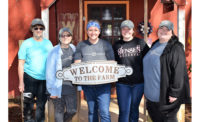All too often, government is seen as the “bad guy,” and the argument is not without merit. Government regulations seem to be a perpetual cause for complaints from some in the industry, whether it’s far-reaching measures like the Affordable Health Care Act or industry-specific issues over country-of-origin labeling or the Food Safety and Inspection Service. There are times, however, when government agencies can be beneficial to businesses – particularly small ones that could benefit the most from a little assistance.
Boyd Industries, based in Colton, Calif., produces a variety of beef jerky products. Its top brand is Carnivore Candy, and it also is a prolific private label manufacturer of jerky. Founder Jae Boyd estimates that the company produces products under 175 different labels. The company got its start from a jerky recipe that dates back to the 1950s, but the business itself is about three years old.
Boyd came to beef jerky from a unique perspective. He spent 28 years working for a concrete roof tile manufacturing company. While the two end products could not be more different, there is a common thread.
“The curing system for concrete is basically a giant dehydrator, and over that 28 years, I had the opportunity to learn a lot about curing,” Boyd says.
His employer closed down its California facility when the building market crashed during the last recession, and Boyd decided to follow through on a dream. He had been experimenting with his mother’s jerky recipe for some time, and whenever he gave it to friends and associates, they asked if they could buy some. He, along with his mother, brother and daughter, launched Boyd Specialties.
The company started with a do-it-yourself attitude. With his background in construction, Boyd and his family renovated a facility themselves and even built a custom oven to produce jerky, using his knowledge from the concrete sector.
“From what people tell me, I should just get out of jerky and make ovens,” Boyd jokes. “It’s unique and proprietary, and it enables us to make a consistent product.”
Over the last two years, the company has enjoyed strong growth. At the onset, it was producing 500 3-ounce bags of jerky per week. After expanding the facility and installing a second oven, Boyd Specialties produces about 4,000 bags per day – and Boyd estimates the company is only at 60 percent capacity on a single shift. The company has expanded from its original 4 family members to employ 15 employees, and Boyd says he is looking to add on six more workers.
Working with WIB
In order to fill positions as it grew, Boyd Specialties has worked closely with the San Bernardino County Workforce Investment Board. The San Bernardino WIB is one of 49 local boards in California and more than 500 across the country.
Brad Gates, deputy director of the County of San Bernardino Workforce Investment Board, explains that the WIBs are funded through the Federal Workforce Investment Act, and each one has a variety of services that it offers to local business owners.
“We hold a number of business workshops, where we contract with experts to come into our centers and provide business owners with information and expertise on various topics, from marketing to process improvement to human resources,” he says.
The WIB will also work with struggling businesses, providing expertise and resources to keep jobs in the county, and it operates a 1-800 human resources hotline to help owners negotiate all of the rules and regulations in managing employees.
The San Bernardino WIB helped Boyd Specialties fill a number of positions through its job recruitment program. The WIB, at no cost to Boyd Specialties, screened and recruited job candidates per Jae Boyd’s specifications. If those employees were hired, the WIB helped pay for the cost of training them.
Boyd said that the employees the company brought on were not trained in the meat industry, but he has worked with new hires throughout his career to unearth hidden talents.
“Not everyone is cut out for every type of job, but if you could identify where some of their talents are, they could be exemplary,” he says.
One of those employees has become Boyd Specialties’ head butcher and does all the trimming and processing of the meat.
“He’s said he’s had jobs before where he didn’t get any respect or was kicked around a little,” Boyd says. “He stands pretty tall when he works here, and he’s proud of what he’s doing. It makes us feel good that we could give him an opportunity like that.”
As an added bonus, some of the employees hired through the WIB have gone on to recommend others for available jobs, and they have worked out as well. A majority of the employees at Boyd Specialties either came from the WIB or through those recommendations.
“We’re really proud of the relationship we have with Boyd Specialties,” Gates says. “We’re really grateful to have been a part of the growth they have experienced, and I would encourage any business out there to reach out to their local WIB. Most do have a business services component to the work that they do.”
Tips for success
From the onset, Boyd Specialties has set out to offer the consumer something more gourmet than the average jerky products.
“I know for a fact that in our segment, if our product wasn’t superior to anything it’s compared to, we would be in trouble,” he says. “We never wanted to be the low-price leader, because there are too many giant companies for that.”
The company’s Carnivore Candy and other products have gained a fan base, but Boyd says the company’s private label business has been overwhelming. His brother, a graphic designer, put together a website, www.boydspecialties.com, advertising its private label abilities, and customers quickly came calling. Using his custom oven, Boyd says that his company has a very high success rate in gaining customers, once they taste a test batch.
“Larger jerky companies don’t want to put in time for a customer who wants to order only 1,000 or 2,000 bags,” Boyd says, adding that his company will work with a customer from developing a product to designing and printing labels and getting label approval from the USDA.
“A good majority of our customers are people who just wanted to get started, and we’ve seen tremendous growth from these people, because they’re very enthusiastic and very passionate, but they just didn’t have [the capital] to get it up and running,” he says.






Report Abusive Comment